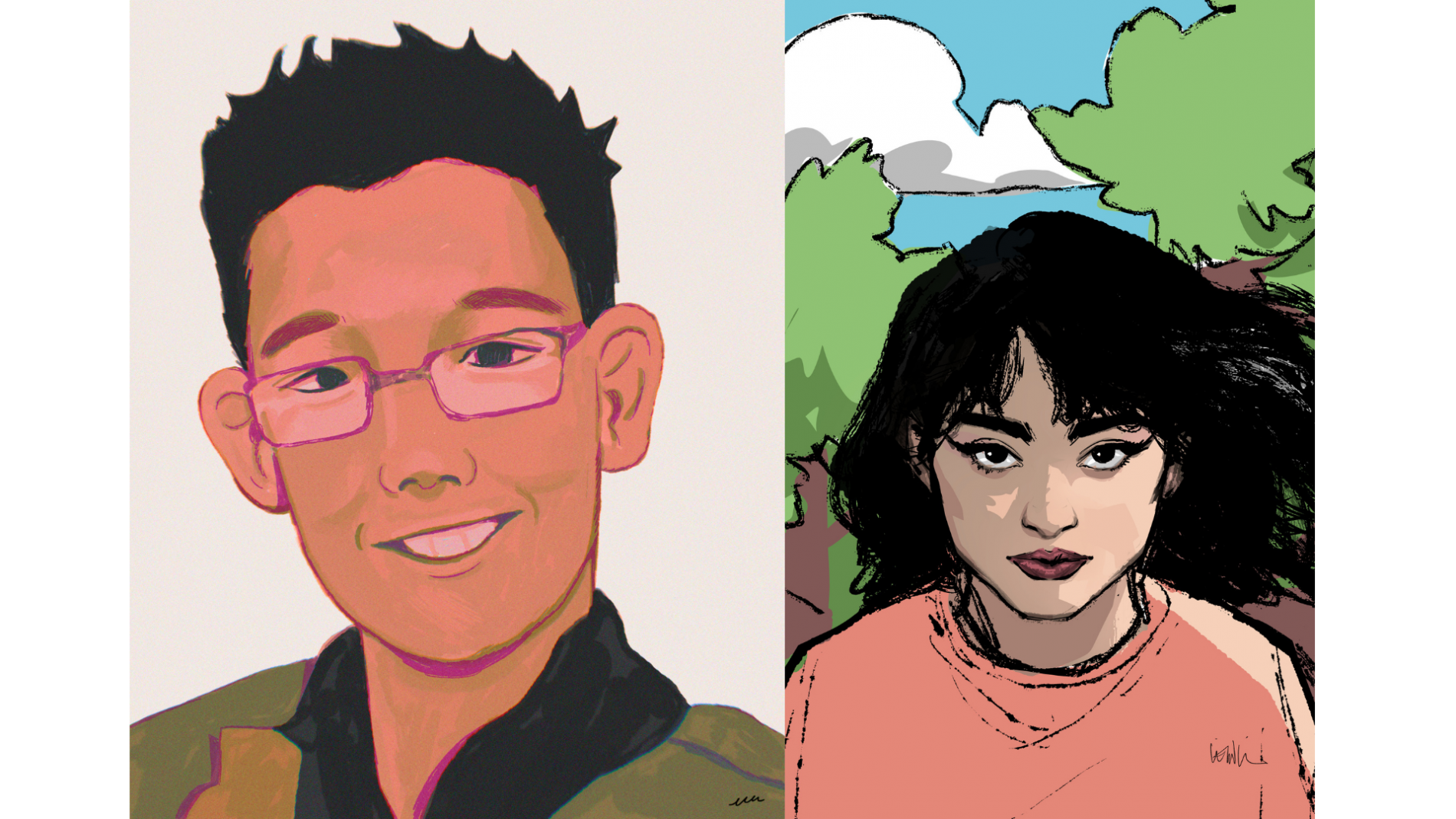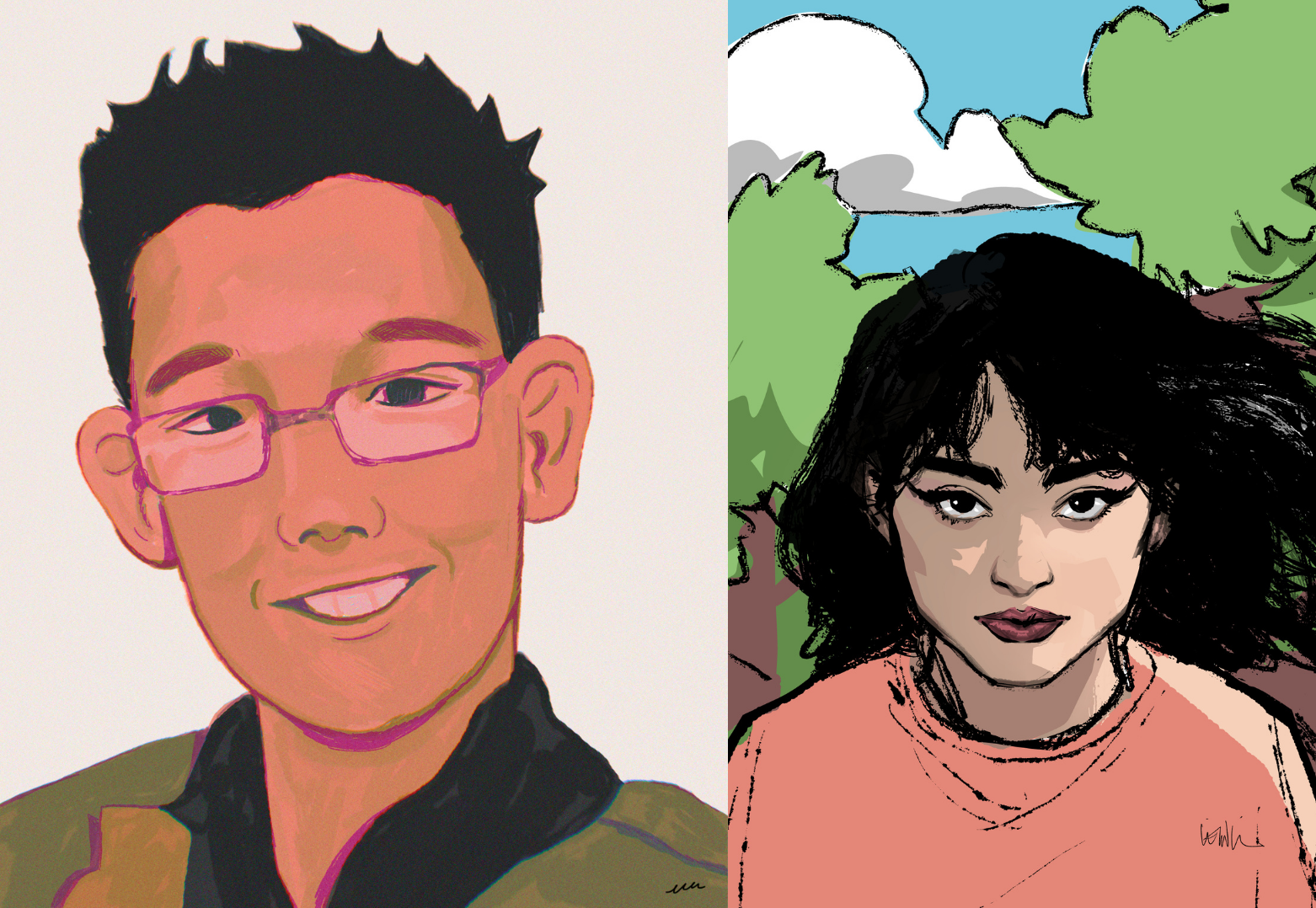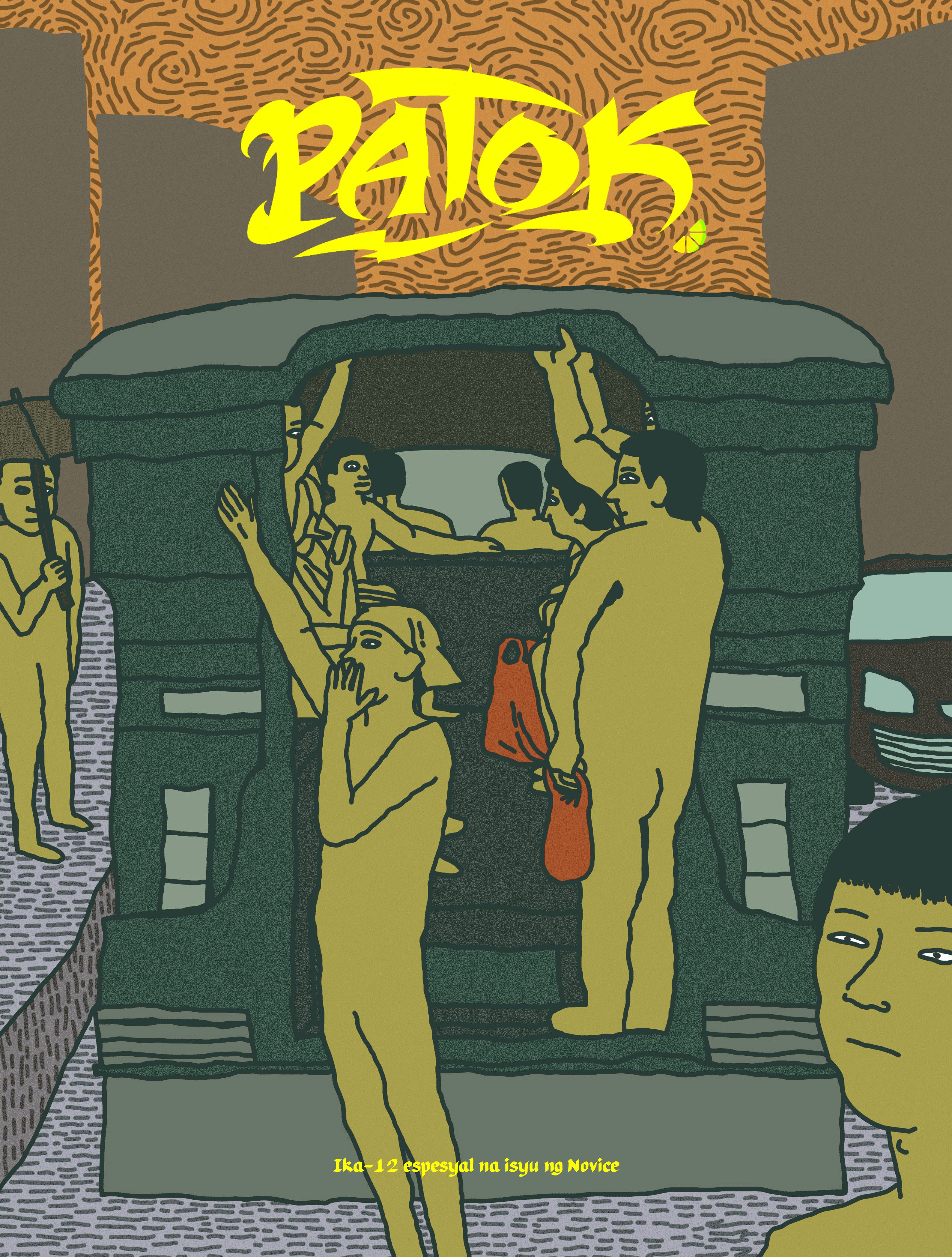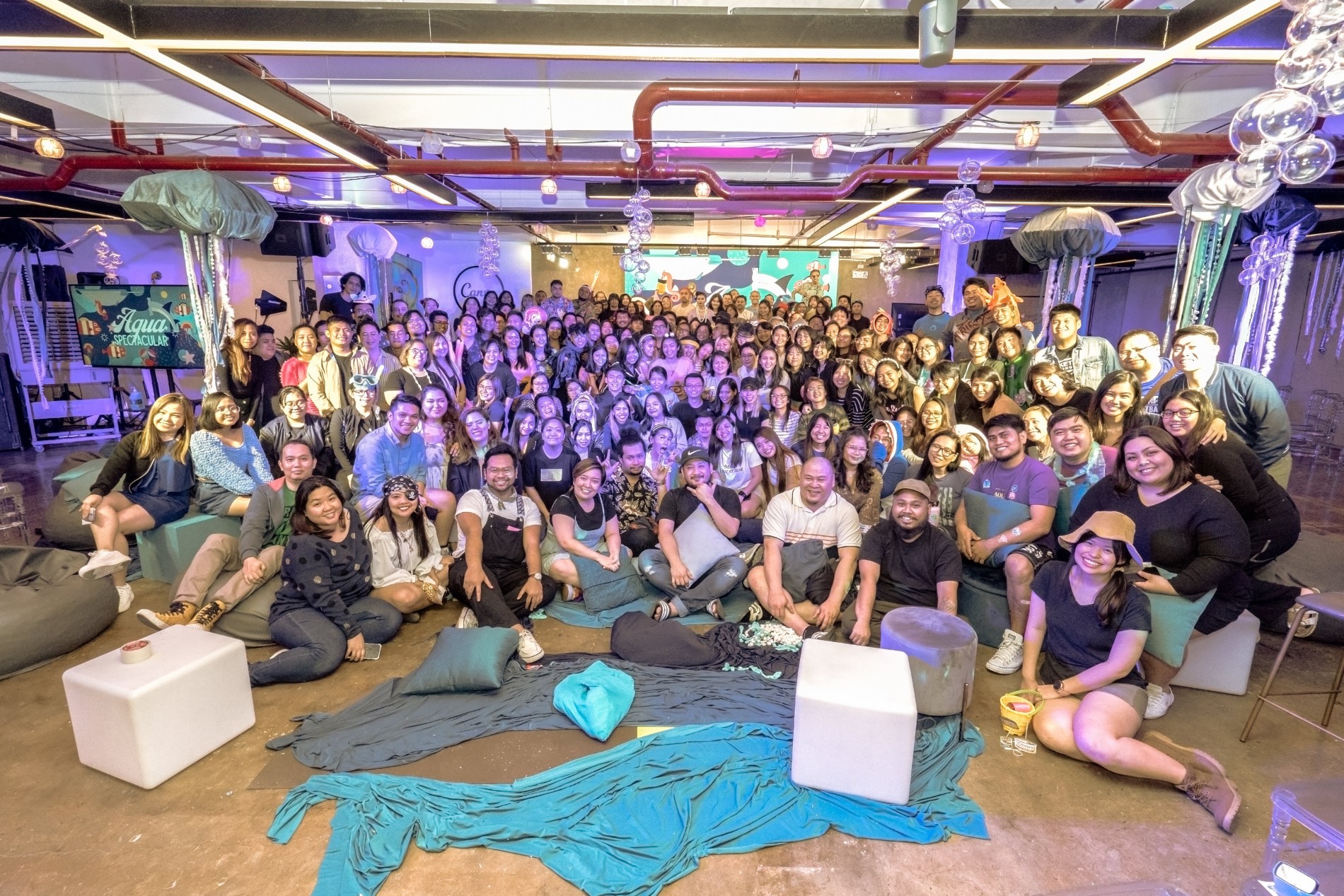
Two comics creators on what it would take for the local comics industry to grow
By CREATEPhilippines
June 24, 2021
Editor's note: Elle Shivers' pronouns are they/them.
Elle Shivers has their grandparents to thank for getting them into comics. When Elle was still little, their grandparents would take the comics page from the Sunday papers for Elle to enjoy. The Far Side, Beetle Bailey, Garfield were just some that kept Elle entertained. They also credit Pugad Baboy for helping familiarize them with tagalog. While Elle would fall off comics during high school, it was in college where they rediscovered comics again. “I met a bunch of people who introduced me to the local indie comic scene,” they say. That’s when Elle really became interested in creating comics.
For a while, Leinil Yu thought he made a mistake. He was still in college when the opportunity came for him to join a studio and illustrate comics full time. “I thought I was going to start agad,” he says. “I thought I was going to do work now and like Wildstorm Comics agad, Image Comics agad and then I had to wait like a year to work.” He joined the studio as the comic book industry was going down. Titles were being cut which meant less chances came for Leinil. It was a hard time. He came from a very traditional family who expected him to graduate and there he was in the studio with no work. “ was just hanging out sa studio playing PlayStation but it was also awkward. My dad was having doubts already like was this the right decision? I was thinking that maybe I should go back to school?”
When Elle decided to start making comics, they were basically watching their peers and learning from how they all did their comics. To be an independent comic artist is to basically do everything Elle says. Creators would write everything, draw everything , and print everything. “So for me building up the structure for myself wasn't like a complex business plan. It’s really just me. I don’t have a publisher. I don’t have an agent. I'm doing all the legwork putting it out there.”
To both Leinil and Elle’s credit, all the hard work and ups-and-downs have paid off—relatively speaking of course. Leinil has grown to be one of Marvel Comics’ top artists drawing titles such as X-Men, The Avengers, Captain America, and Star Wars just to name a few. The independent comic he worked on with writer Mark Millar called Supercrooks is in development for a Netflix adaptation. Elle meanwhile has been able to balance their day job as an illustrator and art director for Canva with their independent comics career. They just released Cicatrix, a full-colored comic under Bad Student Press and their past comics work has been published in CNN Philippines, Young Star, and Patreon.
Create Philippines talks to both Elle and Leinil over Zoom to talk about what they learned—and didn’t learn—in art school, the struggles of the local comics industry, and what can be done to support its growth.
_

CREATE PHILIPPINES: Hi Elle and Leinil, what’s your schedule like on an average day?
Elle Shivers: I have a day job. It starts at 7 a.m. and I work until 4pm. And I work on all my personal projects at night so I sleep really late. That's what my day looks like.
Leinil Yu: My schedule right now because of the pandemic has changed. Before I wake up at 2 p.m., or sometimes 4 [Laughs.] and then you know I mess around until 12 midnight and work until 6 a.m. I've been trying to change my sleeping patterns. I wanted to normalize it but I'm never successful because given the deadlines I always end up like staying up late and I always find it better to work in isolation at night without distractions. Of course that means I'm also in sync with my editors in the states which is a plus.
How and when did you both start making comics?
Elle: I think my first comic was around 2016. For the longest time, it's just me doing it and it was fun. And then I started getting, like actual paid opportunities. And then 2020 that's when I guess my work online started to gain traction, or like I was actively, you know, being contacted to be a part of like, collaborative zines and stuff like that. I don't do comics full time. I work as an illustrator and art director for Canva actually. So, yeah, that's my day job. But I do comics or make my own comics, when I'm not doing that.
Was it similar for you, Leinil, that you started back in college?
Leinil: Yeah when I was in college that’s also when Alamat Comics with sina Budjette Tan was happening and we were really excited. My friends and I wanted to do our own comic as well. But na udlot lang when I was discovered and got international work but that would have been the path. Perhaps in terms of work, I would be in advertising right now kung wala yung comics. I would just pursue comics on the side and maybe do some concept art.
What’s it like being an independent creator, Elle—especially balancing having full control with doing everything yourself?
Elle: Personally, I find that I feel a lot of freedom in that. Because I don't really care if it's misaligned, or whatever, I don't really care if there are mistakes along the way. Because I have control over it. And I guess for me that's one of the things I value most in my work, since I am an independent creator.
What’s it been like working with international publications as an independent creator?
Elle: I've worked with small presses, here and abroad. And I mean, so far, they've offered me complete creative freedom. They'd look over it and everything, but most of the time, because they were like small presses like independent presses, they’re game to publish whatever.
How different is your experience from Elle’s, Leinil? Like your origin story if you will?
Leinil: My experiences in a way, it's quite limited. Whilce Portacio came to the Philippines in the 90s and started looking for talent. And he was like, our agent, basically, and brought my work there to [Marvel and DC]. Before Whilce, I also had communication with other publishing houses like Dark Horse, I was involved with them and some smaller companies. But there was also some luck involved. Gerry Alanguilan was very instrumental in launching my career. He actually bugged Whilce to give me a chance. And wala pang masyadong Internet noon so I sent my stuff in via FedEx and like traditional mail. It was a very different time.
You both took up Fine Arts in the University of the Philippines. How did that prepare you in any way as comic creators?
Leinil: Actually half of what I learned is irrelevant na just with Photoshop now right? So what I learned there—I was just there for two years—it almost had nothing to do with my comics now, to be honest. It was really focused on old school advertising. I had to do everything on paper. With Photoshop now, that just makes it even more obsolete.
Elle: Even for me, the stuff that I was taught had nothing to do with my work in comics. There was still a huge push for advertising and digital marketing. We still had stuff like figure drawing and printmaking but a lot of it was really geared towards entering the advertising industry.
Leinil: Yeah. So I think most of the stuff that I use now is self-learned. And it's really quite simple actually, just meet your deadlines, always respond to emails because in my experience I have a lot of colleagues who are great artists but they disappear. Yung mga tipong pag malapit na yung deadline, hindi na magpaparamdam.
But Leinil, wouldn’t that be evidence of a lack of formal training or information on managing your career? In some ways, that's a lesson you can learn if there was an art management course?
Leinil: Apparently not? [Laughs] Some people are just unreliable. Work ethic sometimes is built in. But the anxiety of, you know, of not disappointing people is innate sometimes. Like everyone is taught to do well in school, and yet, not everyone does their assignment so to speak. But if you have to teach, you know, “Hey, you have to basically be a good human being” or you have to be taught that if you're asked to do something, do it, I think it's unnecessary to formalize that. But, technical skills like dealing with finance, negotiating deals, and basic workers rights, yes, maybe those things can help.
Elle: Yeah, maybe that anxiety of not replying to an email is rooted in inexperience and lack of knowledge and training.

What do you wish you could’ve learned more about in college?
Elle: I guess my experience when I went to art school was purely learning how to draw, learning how to paint, learning how to use this and that program. But there was no real-life education or no real-life guidance on how to protect yourself as an artist. I get that there are some things that you really learn as you develop as an artist, or as you go out into the real world but I've noticed a lot of my batchmates, when they graduate, they don't know how to navigate the world as a working artist or as independent artists. And there's no shame in this but usually they go to ad agencies, because that seems like the only really clear cut path or because that's the most obvious path to take when you graduate.
We had no art management or guidance in that sense. I think I mean, I was just lucky because I was a working student. So I sort of had more experience talking to clients and negotiating things. So I was like, a tad more prepared when I graduated but like my other batch mates, who had little to no experience, like a lot of people are left lost, which isn't fair to them.
Leinil: I was in China like a couple years ago and yung art school palang nila kasing laki na ng buong UP. So d’yan palang sobrang kulang na tayo. And more than half of the students are women. So it’s really inclusive. Medyo nahuhuli tayo pag dating diyan. So I think it's about putting up good art schools and not to focus on just one kind of art.
Elle: Yeah, I went into VisComm in UP only because that was sort of the closest thing to what I wanted. I wanted to be an illustrator. So even like, here in Manila, where this is the capital already, we just have things like Visual Communication and it’s sort of a jack of all trades, master of none situation where you learn everything, you learn photography, you learn typography, you learn advertising but in terms of the guidance, I didn't get that. So that's something to work towards and have specific courses for illustration, specific courses for graphic design, comics, animations. I know CSB has specific courses for animation, and like multimedia arts. It would be good to have that.
I was talking to my thesis professor in UP, like two years back, I don't know if they're still pushing for this but one of the plans for FA was to really break VisComm into different courses. They wanted to have an animation department and they wanted to have a photography only course. So I think that would help. Again, there's nothing wrong with going into advertising but that would help a lot of artists actually pursue, you know, that specific craft. Instead of realizing that they weren't able to hone it in college, and you know, go into advertising because that's the clearest way to pursue a creative career here.
Leinil: Like what Elle was saying, ideally there would be more about how to actually make a living as an artist, so you would know more about your rights and how to negotiate.
Elle: Yeah that's not really like, particular to comic art. It's more like a general need, actually. For everything, not just for art, not just for comics. It should be for everyone who wants to work.
What other kinds of support do you think could really benefit comic creators?
Elle: As a comic creator, I'd like to see more publicly funded grants, which will incentivize independent artists to pursue and realize their creative projects in a more comfortable space and pace. Because while we have privately funded grants by banks and oil companies, I've noticed they're mostly for the fine arts. Secondly, more material support from the government in the form of strengthening our arts education programs, which will, I guess, hopefully, kickstart more holistic appreciation and engagement with art in general. So this isn't just like art school. This isn't just for like art school programs but in all levels of education. Because in high school, we have this thing called MAPEH (Music, Arts, Physical Education, and Health) where it’s compressed into this one subject, which doesn't make sense to me. There's really a huge gap in arts education and I feel that that's why not a lot of people take it seriously. Third would be a proper and robust archival system of historical and currently circulating comics, especially from the independent artists, because we really have a wealth of comics history here in the Philippines from the 70s, 80s, and 90s.

What would you say are the hurdles or challenges facing the local comics industry today?
Elle: I think accessibility is a big hurdle from my experience. If you take Japan for instance, or even like other East Asian countries, their comics industry is super huge because I feel that there's essentially no hurdles to access to these things, [they’re] sold in convenience stores and more recently, there's a push for online apps where you can read these works at a low subscription price legally. And while social media is there, at the end of the day, we're all sort of slaves to the algorithm. So it's hard to build and maintain a following. Social media sites like Twitter and Instagram aren’t meant for artists. You can post your art there, but someone's also posting their selfie or their vacation picture. So it's not a place to look for art, even if a lot of artists are there.
I don't know if you guys have heard of Penlab but it's an initiative that publishes Filipino indie comics digitally for free. It's an online library and everything is free, and it's centralized, and it's easily searchable.
Leinil: Sa akin lang in terms of sharing your work on social media, if merong sobrang galing, you can’t help but notice it. But yeah you have to stand out and you have to be lucky to be seen by someone at the right time.
Don't you think limited rin yung audience ng local Filipino comics just because it's mostly in English? The demographics and the audience targeting is a bit limited? Like it’s maybe a bit more upper class just because of the language?
Elle: Yeah, I definitely agree. Just the demographics of Komiket and Komikon, like I can say that that’s very apparent.
Over the last several years, we’ve seen how Intellectual Property has become more in demand than ever. And with the recent success of Trese, there’s now greater focus on comics IP. As creators, what are your thoughts on private and public sectors looking into expanding comics IP?
Leinil: As long as the creator still owns it or is a part owner then why not.
Elle: Yeah, I agree. From my perspective, as an independent comic artist, if I were to write a story, my concern wouldn't really be to grow it or to produce offshoots of it. I feel that there's a main consensus that comics are sort of the precursor to high budget TV shows or film adaptations, especially with superhero comics. They think of TV or film as sort of the end product or the end goal. But since I'm more of in the indie comics scene, like developing an IP that would lead to adaptations, that isn't something that I feel is necessary to my work. And I don't think it's something that I necessarily want either. Because I'd be perfectly happy and perfectly satisfied if my work were to end there as a comic.
As for support, if they help the creator with let's say legal advice, how to deal with IP, and if the creators get to retain the ownership, that would be great. But is that really possible? I think it really boils down to the creator themselves, and the kind of work they make, like what their intent is for their work. And as an artist, and for the work itself.
Leinil: Also, when it comes to IP, we have to recognize that the chances of it becoming a movie or whatever is one in 100. Maybe not even one and 100. Like even in Image Comics, sa dami ng titles nila, ilan lang sa kanila yung naging movie or TV show.
I guess for the government, the public and even the private sector, it's really just providing infrastructure for it to happen.
Elle: I agree. I think the bottom line is it all boils down to creating a space or creating an environment where comic artists can comfortably work on their comics. And everything else will follow. Because the reason why we don't have more IPs like Trese and why we don’t have as much compared to other countries is because everyone has a day job here. Nobody can work on creating the next great IP.
What do you think people who want to help the industry—from both public and private sectors—need to know?
Leinil: That my and Elle’s worlds are actually quite different. So how do you actually want to help? Do you want to make a farm of local artists to work on Marvel superheroes? Because that’s very different from “Are you going to nurture local artists and help them make their own comic books?”
Elle: Yes, I think that's a danger if they don't really know about the industry. They tend to collapse all creative industries into one.


